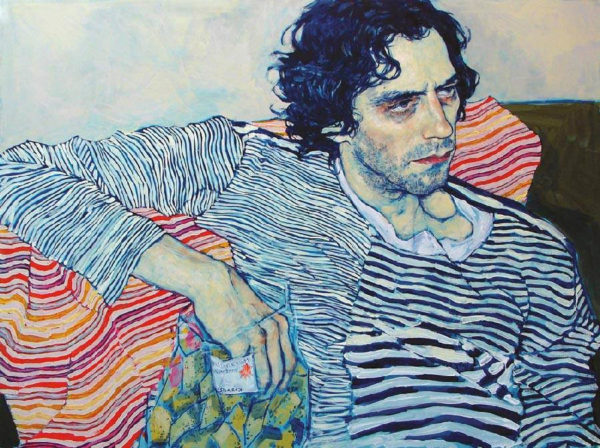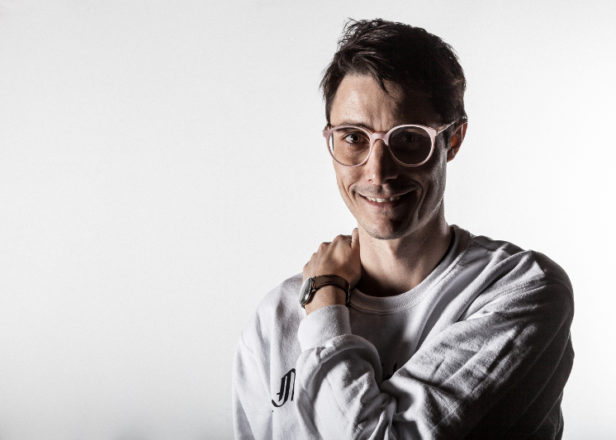Joe Seaton, the man behind the Call Super moniker, has quietly been carving out a name for himself in the modern electronic music lexicon over the last six years. As a producer he commands the album format with great skill and the two examples, Suzi Ecto and Arpo via Houndstooth, are exemplar approaches to the LP in a modern electronic framework. Cascading rhythms vie for space in Seaton’s lattice-like percussive and melodic rhythms as tracks move like a rigid organism across the temporal. There’s a cultivated touch to the production as echoes from a broad cultural palette ring through these works and re-establish themselves as electronic organisms in beatific harmony with their new digital habitat.
Seaton adopts a similar approach on EPs and singles like Nervous Sex Traffic and Inkjet, but stripping back the layers and rhythms to where they operate with a more functional design and a view from the DJ booth. Atmospheric textures crowd staunch, unwavering repetitive motions, in seductive melodic and harmonic arrangements with heady effects.
The studio it seems however is an entire world away from the decks for Seaton and Call Super the DJ is as much an anomaly as the producer, and the two seem to operate at vastly different trajectories from the artist at their core. While Call Super’s music can often be solemn, timid and introspective, his sets lend an unexpected vibrancy and buoyancy to the artist. For the most part he has favoured music from the “windy / motor / big apple cities” with a very distinct approach; similar, but not quite like to the rhythms in his productions.
His sets today are a far cry from the Hard UK Techno and Trance that started it all for a fifteen year old musician living in the UK. Although Seaton had started picking up instruments at an early age, creating little “vignettes” of songs from his piano and guitar, while at the same time exercising his creativity as a visual artist, it would be through electronic music that he would leave his most definable mark. His EP The Present Tense launched the Houndstooth label in 2013 and started a relationship that lasts up to this day with 2017’s Arpo, marking the 80th release from the UK label, and consolidating the sound of Call Super in the process.
Inspired by every thing around him and very honest in his artistic approach, Call Super’s music and DJ sets often don’t relay the extent to which he immerses himself in his work. He’s a candid character however and has laid everything bear in countless interviews, but some questions remained and we sent some of these off to Joe Seaton on a hope and a prayer that he would answer them. He happily obliged and in return we got some insightful, often amusing answers.
q* Call Super joins G-Ha & Olanskii and Burnt Friedman next week for Frædag in our basement.
It’s said you’re inspired by things beyond music. What is currently inspiring you?
Raymond Chandler, Peter Hujar, Alice Neel, Ganryu (RIP), Max Roach, mess.
You’ve had prolific recording career compared to most electronic music artists. What’s so conducive about the studio environment for you?
I’m not so prolific. A lot of people today have even fewer ideas than me so I guess they make me look good. You can get a long way on not much it seems.
Your releases centre around the Houndstooth label. How does the label influence or affect your creative approach if at all?
It doesn’t.
The singles like Nervous Sex Traffic and Inkjet clearly have more designs on the dance floor than your albums, Suzi Ecto and Arpo. What are the circumstances that steer you in the direction of a single rather than an album or album track?
I can dance to all of it. I don’t want to make so many albums because it’s crucial an album has something to say about the format otherwise it doesn’t really justify its existence: it’s just a compilation of songs.
Does a premeditated idea usually inform an album?
Maybe a few. A mix of big ones like, um, death, and small ones like maybe confusion is perhaps useful. As well as obviously having some interesting artistic ideas that haven’t been raked over thousands of times before.
What sort of evolution do you think there is between Suzi Ecto and Arpo?
Arpo is a cadmium red, Suzi was closer to blue.
Contrapuntal and syncopated/uneven rhythms are a recurring theme in your music from the albums to the singles. What usually informs the rhythm of a track?
No idea, maybe a need for variance. Sorry, I’m not doing so well at this..
From time to time this approach to rhythm makes it into your DJ sets too, but do you feel there is a direct correlation between your sets and your recorded material other than the person behind them?
I try to keep them pretty separated. I like it that way.
You haven’t taken your material to the stage yet with a live show like so many of your peers. What do you prefer about a DJ set?
I usually don’t find this kind of music so engaging live, and I would rather spend my time making music rather than trying to solve my issues with the live thing. I love playing music in clubs and I love a whole lot of music so DJing makes sense to me.
Some of my personal favourite moments is seeing you and Objekt play back to back. What do you bring out in each other that makes it such a dynamic partnership in the booth?
I guess we play to each other as well as the crowd and maybe people pick up on our love.
This will be your first time playing at Jæger and without knowing too much about the club or the night how would you usually pack your record bag?
Records, wash bag, socks, underwear, USBs, huge torch, book, phone charger, two small torches, tee shirt, passport and ear plugs. Maybe I’ll bring a hat too, it’s cold outside I guess.

